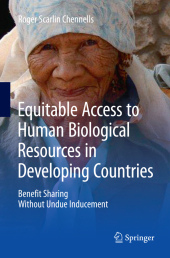 Neuerscheinungen 2016Stand: 2020-02-01 |
Schnellsuche
ISBN/Stichwort/Autor
|
Herderstraße 10
10625 Berlin
Tel.: 030 315 714 16
Fax 030 315 714 14
info@buchspektrum.de |

Roger Scarlin Chennells
Equitable Access to Human Biological Resources in Developing Countries
Benefit Sharing Without Undue Inducement
Softcover reprint of the original 1st ed. 2016. 2016. xix, 197 S. 235 mm
Verlag/Jahr: SPRINGER, BERLIN; SPRINGER INTERNATIONAL PUBLISHING 2016
ISBN: 3-319-36974-1 (3319369741)
Neue ISBN: 978-3-319-36974-7 (9783319369747)
Preis und Lieferzeit: Bitte klicken
The main question explored by the book is: How can cross-border access to human genetic resources, such as blood or DNA samples, be governed in such a way as to achieve equity for vulnerable populations in developing countries? The book situates the field of genomic and genetic research within global health and research frameworks, describing the concerns that have been raised about the potential unfairness in exchanges during recent decades. Access to and sharing in the benefits of human biological resources are aspects not regulated by any international legal framework such as the Convention on Biological Diversity, which applies only to the exchange of plants, animals and microorganisms, as well as to associated traditional knowledge. Examples of genetic research perceived as exploitative are provided in order to illustrate the legal vacuum concerning the global governance of human genetic resources. The main conclusions drawn from the legal and ethical analysis are:
- Benefit sharing is crucial in order to avoid the exploitation of developing countries in human genetic research.
- With functioning research ethics committees, undue inducement is less of a concern in genetic research than in other areas of medical research (e.g. clinical trials).
- Concerns remain over research involving indigenous populations; accordingly, recommendations are provided.
In drawing these conclusions, the book addresses in detail a highly pressing topic in global bioethics and international law. In this regard, it combines bioethical arguments with jurisprudence, in particular with reference to the law of equity and the legal concepts of duress (coercion), unconscionable dealing, and undue inducement.
Introduction.- Exploitation.- Common Heritage of Humankind.- The Altruism Argument.- The ´No Value Added´ Argument.- Justice and Exploitation in Bilateral Exchanges.- Undue Inducement and Coercion.- Risks to Indigenous Peoples as Vulnerable Population.- Closing Chapter.


